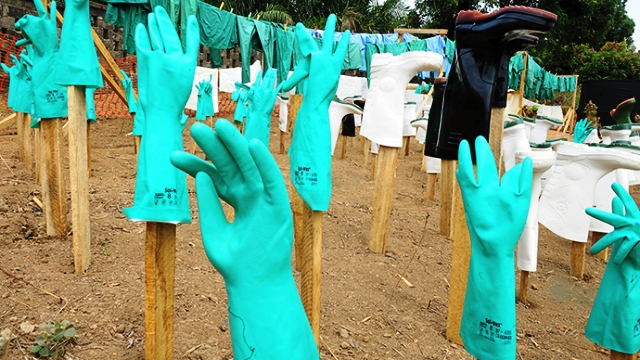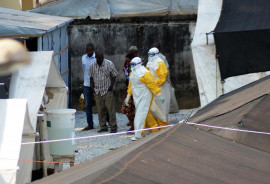
LAHORE:
The World Health Organisation (WHO) has arranged a meeting with health workers and security staff deployed at airports and shipping ports in Pakistan to brief them on how they can remain vigilant and deal with passengers arriving from West African countries where Ebola virus has left an estimated 2,100 dead since February.
A senior WHO official in Pakistan, an expert on infectious diseases, told The Express Tribune the meeting will take place this week in Islamabad. The official, not authorised to speak publicly, said WHO held several meetings with health authorities to guide them on procedures to contain the virus’ spread to Pakistan.
“The screening of passengers coming from at-risk countries like Guinea, Sierra Leone and Liberia is not recommended but officials at airports and ports should ask certain questions from these passengers and take their contact details,” the official said. “A carrier of the virus may remain asymptomatic for 21 days so taking their contact details is important in case symptoms show after some time.”

Is an outbreak feared in Pakistan?
The ministry of National Health Services Regulations and Coordination has issued an advisory to Islamabad Capital Territory (ICT), Capital Development Authority and Chief Secretaries of all four provinces to take precautionary measures against Ebola disease. The ministry warned that the virus might be transported to Pakistan through people coming in from African countries. However, the officials say they hope the virus will not reach Pakistan as the number of travellers from affected countries to Pakistan is relatively low.
“The virus is currently causing havoc in four West African countries and other than Pakistani troops, no Pakistanis normally visit those countries nor do people from there come here,” Ministry of National Health Services Acting Director General Dr Asas Hafeez told The Express Tribune. “However, we have held meetings with military officials and a standard protocol is being followed to take precautionary measures. The troops that are in affected countries are being brought back after they complete a period of 21 days, the incubation period, over there. So the outbreak of the disease is not expected in Pakistan.”
Additionally, he said the National Institute of Health (NIH) has made arrangements to transport the samples of suspected patients to a laboratory in Cairo, as the tests are only available in Cairo in this region under WHO’s setup. “The positive aspect is that this disease isn’t spread until the patient is asymptomatic, so we don’t need to isolate risky passengers,” Hafeez said.
How does Ebola spread
Ebola Virus Disease (EVD) is a severe acute viral illness often characterised by the sudden onset of fever, intense weakness, muscle pain, headache and sore throat. This is followed by vomiting, diarrhoea, rash, impaired kidney and liver function, and in some cases, both internal and external bleeding. Laboratory findings include low white blood cell and platelet counts and elevated liver enzymes.
People are infectious as long as their blood and secretions contain the virus. The incubation period - the interval from infection with the virus to onset of symptoms - is 2 to 21 days. Human-to-human transmission of the Ebola virus is primarily associated with direct or indirect contact with blood and body fluids. Transmission to health-care workers has been reported when appropriate infection control measures have not been observed. The WHO said one of its own doctors working at a government-run Ebola treatment center in Freetown, the capital of Sierra Leone, would be evacuated after having tested positive for the disease on Tuesday.
“Ebola and HIV have lots of similarities but the former is more dangerous. The incubation period of HIV is almost 10 years whereas Ebola develops into a full blown disease in just a week and attacks the nervous system. The disease is endemic in West Africa,” Pakistan Institute of Medical Sciences (Pims) Vice Chancellor Prof Javed Akram said.
There is no licensed vaccine to treat EVD. Several vaccines are being tested but none are available for clinical use.
Published in The Express Tribune, September 10th, 2014.
COMMENTS (7)
Comments are moderated and generally will be posted if they are on-topic and not abusive.
For more information, please see our Comments FAQ


































































Must admit I'm curious as to why no one is reported to have tried clomiphene. Still, if I keep on looking, no doubt the reasons will become evident eventually. Anyway, good luck. I hope you dodge this one.
Please vote:
Border closures, flight bans and mass quarantines must be imposed to control the spread of Ebola or
Instead of closing borders, better treatment options and access to food and water must be ensured.
http://www.ebolacentral.com/
Maybe prudent move to temporarily ban travel to/from West African countries - like it or not if Ebola gets a foothold in Pakistan your no better off to handle it than the African countries where it is running rampant.
@Sodomite: We don't need to perform original research on these diseases here. Just follow the guidelines and we'll be fine. Polio, Dengue and Malaria are spreading because of our failure to follow proper procedures against these diseases.
Pakistan has not eradicated dengue how are they going to fix Ebola?? We don't have British Universities capability to tackle Tropical Diseases or Centers for Disease Control such as one in Atlanta, GA. Pakistanis bureaucrats need to grow up.
and what about Neglaria ? which has killed 12 people in Karachi only ? and which has spread due to the absemce of Chlorine in water supply due to the corruption of Wadera Corruption Party wadera thugs who eat up everything that comes their way and who have turned Karachi into a plundered occupied colony through their joint rule with MQM ?
Really? How about the one which is so easy to fix - Polio!